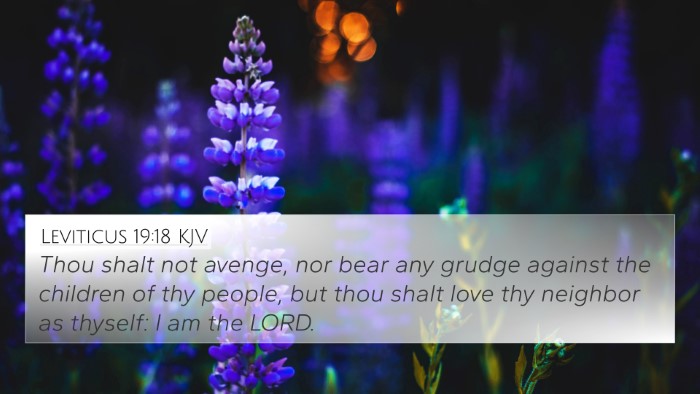Bible Verse Meaning for Luke 10:27
Luke 10:27 states: "He answered, 'You shall love the Lord your God with all your heart and with all your soul and with all your strength and with all your mind, and your neighbor as yourself.'" This verse encapsulates the essence of Jesus' teaching on the law and love, emphasizing the importance of love for God and love for others.
Summary of Insights from Public Domain Commentaries
1. Matthew Henry's Commentary
Matthew Henry highlights that this verse demonstrates two vital commandments that string together all of the Law and the Prophets. The outward expression of love to God is manifested through the inward commitment of heart, soul, strength, and mind. This all-encompassing love also extends to one's neighbor, emphasizing the unity of both commands.
2. Albert Barnes' Commentary
Albert Barnes elaborates on the idea that loving God involves a complete allegiance and devotion. He signifies the inner faculties—heart (emotions), soul (spiritual being), strength (physical), and mind (intellectual)—as all essential in reciprocating God’s love. Love towards one’s neighbor creates a moral framework that is beneficial not just for society but is crucial in sustaining divine relationships.
3. Adam Clarke's Commentary
Adam Clarke outlines that the command to love one's neighbor is reminiscent of Leviticus 19:18, establishing a continuity in God's message throughout Scripture. He stresses the importance of self-love that, when understood correctly, leads to healthy relationships with others. The dual command of love reveals the intricate relationship between divine and human interactions.
Cross-References to Luke 10:27
- Deuteronomy 6:5: "You shall love the LORD your God with all your heart and with all your soul and with all your might." This Old Testament foundation parallels Luke 10:27.
- Matthew 22:37-39: Jesus reaffirms this command, echoing the same emphasis on love towards God and neighbor.
- Mark 12:30-31: Similar to Matthew, but presented in a slightly different narrative context, repeating the significance of these commandments.
- Romans 13:9: Paul reiterates the moral implications of loving one’s neighbor, showing that obedience to God’s law is fulfilled in love.
- Galatians 5:14: Paul states that the entire law is summed up in love for one’s neighbor, reinforcing the connection between love and the law.
- 1 John 4:20: This verse insists that love for God cannot be separated from love for one another, strengthening the bond established in Luke 10:27.
- Leviticus 19:18: The original command to love one's neighbor, forming the Old Testament roots of the New Testament teaching by Jesus.
Thematic Connections and Analysis
The verse finds a home within the larger framework of Biblical themes that explore love and relationships. By interlinking various passages, we see:
- Divine Love: An exploration of how our love for God reflects our understanding of His love for us (1 John 4:19).
- Ethical Living: The application of love to daily ethical decisions is a recurring theme throughout the Pauline letters.
- The Role of the Heart: Love originating from the heart as a central Gospel theme, which is foundational for faith and relationship building (Proverbs 4:23).
Practical Implications
Embracing the teachings of Luke 10:27 can dramatically impact a believer's life. The call to love with one's entire being promotes:
- Holistic Faith: Integration of spiritual, emotional, and physical dimensions in daily life.
- Community Engagement: Committing to living out love and compassion in our interactions with others.
- Self-Reflection: Understanding personal barriers to love that may prevent the fulfillment of these commandments.
Conclusion
The essence of Luke 10:27 transcends mere ethical teaching; it offers a transformative understanding of our relationship with God and others. The command to love encompasses a holistic lifestyle that corresponds with various biblical texts, demonstrating how interconnected Scripture truly is. The deeper one engages with such verses, the more one uncovers the rich layers of divine truth and relational dynamics that define the Christian faith.
Tools for Further Study
To dive deeper into the meanings and connections between this and other Bible verses, one might consider the following:
- Bible Concordance: A vital resource for locating verses and themes.
- Bible Cross-Reference Guide: Helpful in linking scriptures across different books.
- Cross-Reference Bible Study: Practical methods for studying and understanding the Bible in context.
The exploration of Luke 10:27 provides insight into how to think about and practice love within the context of a faith journey, urging believers not just to observe the Word, but to enact it in their daily lives.















